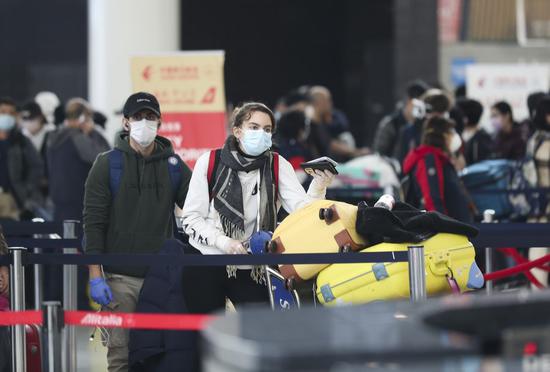
Passengers wait to depart at John F. Kennedy International Airport in New York, the United States, March 13, 2020. (Xinhua/Wang Ying)
Special:Millions of Americans are traveling for the Thanksgiving holiday despite a deadly surge in coronavirus cases and a "don't do it'' warning from the Centers for Disease Control and Prevention (CDC) and public health experts.
More than 3 million travelers were screened at U.S. airports on Friday, Saturday and Sunday, according to data from the Transportation Security Administration. Sunday ranked as the single-busiest day at airport checkpoints since the pandemic began in March, with 1 million people screened. That was less than half the number for the same time in 2019, but still raised concerns as some travelers wore masks while others didn't.
For U.S. airlines, Thanksgiving has been one of the busiest periods of the year. Last year, 31.6 million Americans flew on carriers in the run-up to the holiday. That generated $8 billion for the industry out of a total of $247 billion revenue in 2019. This year, American Airlines has increased flights to accommodate the travel rush. It usually has 3,400 flights a day but now has 4,000 over the holiday.
"There is so much community transmission all over the United States that the chances of you encountering somebody that has COVID-19 is actually very, very high, whether it's on an airplane, at the airport or at a rest area," said Dr Syra Madad, an infectious-diseases epidemiologist for New York City hospitals.
More than 50 million Americans will travel by various means for Thanksgiving this year, a drop from 55 million in 2019, according to the American Automobile Association (AAA).
Paula Twidale, senior-vice president at AAA, predicts that the majority will go by car. Based on surveys in mid-October, the association was expecting 47.8 million people to drive to Thanksgiving gatherings, down from last year.
"Americans in our research are telling us they are tired of being at home," said Roger Dow, president and CEO of the U.S. Travel Association on a conference call with journalists on Nov 19. "They don't want to give up taking trips and they also want to see their friends and family for the holidays."
Amid a worsening pandemic, the U.S. continues to break records with the number of cases and deaths. The death toll from COVID-19 was 257,415 on Monday, according to data from Johns Hopkins University. There were 142,732 new coronavirus cases on Sunday. That day, 921 people died. On Friday, there was a record high of 196,000 cases, and more than 83,870 people are in hospital with the virus.
Since last week, the CDC has been urging people not to travel for the holiday nor spend it with people outside their household.
Dr Anthony Fauci, director of the National Institute of Allergy and Infectious Diseases, sounded the alarm again on Sunday: People at airports "are going to get us into even more trouble than we're in right now".
"One of the things we're really concerned about is that as we get into this Thanksgiving season, you're not going to see an increase until weeks later. Things lag. So, what you don't want to see is another spike in cases," he said on CBS' Face the Nation.
The CDC advises people still heading to Thanksgiving gatherings to "bring your own food, drinks, plates, cups and utensils. Avoid areas where food is being prepared. And use single-use options, like salad dressing and condiment packets."
Airlines and airports are taking extra precautions to help prevent the spread of the coronavirus, including deep cleaning and disinfecting high-touch surfaces in airports and in airplane cabins; placing markings on floors to help people remain at least six feet apart; and mandating the wearing of face coverings or masks at all times.
The Swedish drugmaker AstraZeneca announced on Monday that interim data for its vaccine candidate suggests 70 percent protection, but the researchers say the figure may be as high as 90 percent by tweaking the dose.
The company, which has been developing the vaccine with the University of Oxford, became the third major vaccine developer this month to announce encouraging early results, following Pfizer and Moderna, whose vaccines are 95 percent effective.
